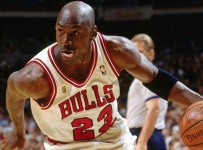I know we are all still busy filling out NCAA tournament brackets today, so I will keep this short…
Unless you have been living under a rock, you know that this week kicks off the NCAA men’s basketball tournament, also known as March Madness. A time I call the most wonderful of the year.
In reading up on the tournament, I have noticed that a lot of people are making lists. Lists of teams most likely to make the Final Four, most vulnerable to an upset & top picks to be this year’s Cinderella.
I thought I would join in on the list making fun by creating the 5 Things We Can Learn From March Madness. Enjoy…
1. Having A Catchy Name Helps
March Madness. It is fun to say, involves alliteration & looks good on a t-shirt. All the ingredients of a great name. The NCAA tournament is a multi-billion dollar business that attracts fans from all over the world. Would it be as popular if it was simply called the men’s college basketball tournament? Maybe, maybe not. But why call it the MCBT when you can call it March Madness!
Does your business have a catchy name? If not, maybe it is time to find one.
2. Having A Catchy Name Isn’t Everything
I know I just said that having a catchy name is important, but I am also going to say that your name can really only do so much for you. My brother and I play a lot of ping-pong. We don’t have a name for our games, but pretend we only played in March and we called it March Madness. Ignoring the trademark laws we just broke, would our ping-pong matches attract billions of dollars and millions of fans? No way.
A name can only take you so far. Your business may have the best name ever but if your quality stinks, you won’t be successful. NCAA March Madness has a great name and an even greater product.
(P.S. Just in case you were wondering, I always beat my brother in ping-pong)
3. People Care
As you watch the tournament this year great ready for one thing…I’m not talking about upsets. Not buzzer beaters. Not amazing plays…those things will happen too, but you will also see a lot of crying. Players will cry when their college career ends. Fans will cry when their team is eliminated. And degenerate gamblers will cry when their NCAA tournament lock gets upset in the first round.
Why so much crying? Because people care. Players put their heart on the line in order to prolong their career. Fans spend hours of their time and thousands of their dollars following a team a 12 young men from one game to the next. At a certain point it becomes more than winning and losing.
Do people cry over your business? Probably not. But do they care? If you are doing it right, they will.
4. Opinions Differ
College basketball experts cannot agree on who will make the Final Four. If you look at brackets from the people paid to cover the sport, you will notice that they look very different. One expert’s lock to make the Elite Eight is another expert’s lock to be upset in the first game.
Why can’t these so called experts agree? Because no one really knows what is going to happen. If everyone knew what to expect, the tournament wouldn’t be nearly as exciting and sites wouldn’t be offering $1 million dollars in their bracket challenge.
Do the experts agree on the future of your business? It is not the end of the world if they don’t. In fact it might just make you more attractive.
5. Things Change When Your Back Is Against The Wall
When I pick a bracket, I rarely pick upsets. I select the teams the same way I would if they were playing on December 17th, not March 17th. That strategy nearly always backfires. Why? Because teams have a lot more to play for on March 17th than they do December 17th. This could be the last game a player ever plays for his college. His back is against the wall, he responds positively and plays out of his mind. Contrast that with the player who is too tense and plays terrible. A game on December 17th does not feature the same type of pressure. Upsets are created by how 18-22 year olds react to this pressure.
How does your business respond when your back is against the wall. How do you react to pressure?
Photo credit: Wikipedia




